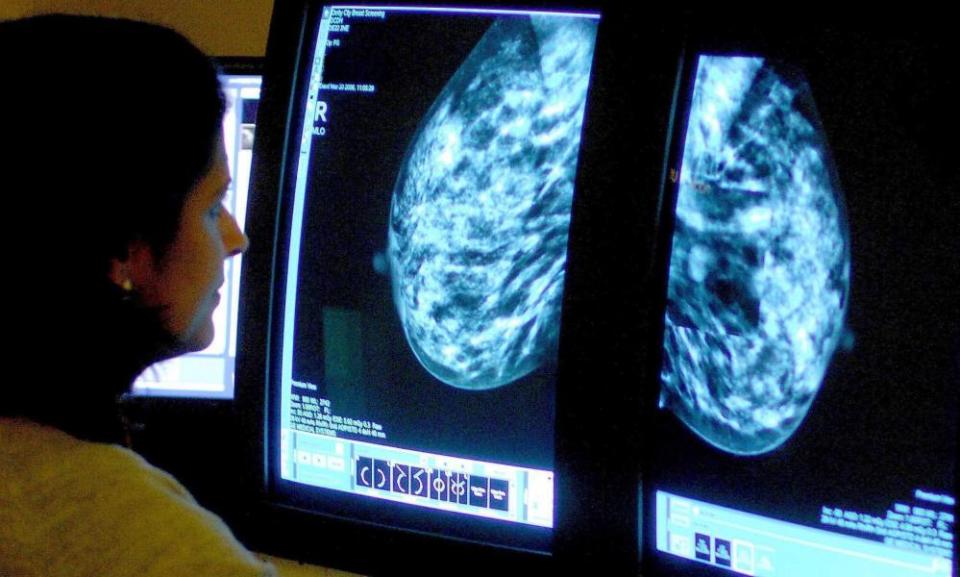Life-extending drug for incurable breast cancer approved for NHS use

Women with incurable advanced breast cancer will be able to get a drug from the NHS that can potentially extend their life by almost eight months, under new guidance.
The National Institute for Health and Care Excellence (Nice) has approved the drug – ribociclib , also known as Kisqali – for routine use by the NHS in England and Wales. It said about 3,300 women a year with advanced breast cancer could benefit from the decision.
Nice said ribociclib could be used alongside another drug, fulvestrant, to treat hormone receptor-positive, human epidermal growth factor receptor 2 (HER2)-negative, locally advanced or metastatic breast cancer in women who have already undergone endocrine therapy and where another drug combination – exemestane alongside everolimus – is otherwise judged to be the most appropriate treatment.
The combination of medicines could delay the progress of breast cancer and the point at which a patient needs to start chemotherapy, as well as extend life, Nice said.
Breast cancer campaigners said Nice’s decision on ribociclib, which is taken once a day as a tablet, offered some patients the prospect of extra months of life.
“This life-changing treatment will now bring thousands more women living with incurable secondary breast cancer hope of precious extra time to live well,” said Baroness Delyth Morgan, the chief executive of the charity Breast Cancer Now.
“As well as offering certain patients with incurable breast cancer extra time with loved ones, this innovative drug combination can help delay the need for chemotherapy and its debilitating side-effects.”
About 55,200 people a year are diagnosed with breast cancer; mainly women but including 390 men. It claims 11,500 lives a year – 32 a day – which is more than any other cancer that affects women and the second biggest killer of women behind lung cancer.
Nice’s decision was especially welcome given it recently rejected calls to approve a similar treatment, called abemaciclib, when taken in tandem with fulvestrant, added Baroness Morgan.
A clinical trial found ribociclib and fulvestrant taken together increased median progression-free survival by 5.5 months – from 9.1 months to 14.6 months. Median overall survival also rose, by 7.7 months from 32.5 months to 40.2 months.
However, Friday’s ruling means it is now available through the health service to anyone who needs it after evidence showed that it extended overall survival and had proved to be value for money.
Related: Jen Beattie on her breast cancer diagnosis: 'I wanted to normalise it'
Ribociclib has been available since 2019 through the Cancer Drugs Fund, set up in 2011 by the coalition government to give patients access to unproven or experimental cancer therapies. Nice’s ruling means it is now available through the health service to anyone who needs it, after evidence showed that it extended overall survival and had proved to be value for money.
The drug is what is called a cyclin-dependent kinase 4 and 6 (CDK4/6) inhibitor. It works by disrupting proteins in cancer cells, which stops the cells from dividing and growing. Pills are taken with an aromatase inhibitor, an anti-cancer drug that prevents the production of the hormone oestrogen, which stops it from stimulating the growth of hormone receptor-positive breast cancers. Patients told Nice that CDK4/6 inhibitors are generally less toxic than chemotherapy.
Meindert Boysen , Nice’s deputy chief executive, said: “Treatments that can postpone disease progression are important because they can mean some people can avoid the often unpleasant side-effects of chemotherapy and delay the need for its use in others.
“We are pleased that our original decision to make ribociclib available through the CDF not only gave people access to it earlier than would be otherwise have been possible but has now, through the data collected during that time, allowed us to recommend it for routine use on the NHS.”
Ribociclib is now the third CDK4/6 drug available on the NHS as a first-line treatment, alongside palbociclib and abemaciclib.

 Yahoo Finance
Yahoo Finance 